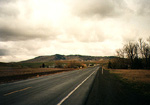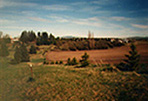PULLMAN
AREA
PARKS
Analysis Tool Kit
The themes illuminated throughout this module are all common elements that not only go into the construction of parks in general, but are also very basic to the social construction of nature. Illustrated in Sunnyside Park and Kamiak Butte is the dual nature of park environments as social and natural settings. Both the social and natural experiences are constructed by certain cultural beliefs and values that define "nature," as well as who participates in the experiences embedded in the design of the park.
In order to analyze the social construction of nature in your own area, choose a park or similar environment in which a natural experience is constructed and consider the following questions as a tool kit for your analysis:
- Setting and Placement
- Where is the park located in relation to centralized populations?
- How does the park's location help to construct the kind of natural and social experiences visitors are supposed to have?
 Consider the location of Kamiak Butte, approximately
10 miles north of Pullman, as opposed to Sunnyside Park, located adjacent to Sunnyside
Elementary School and within a residential area. It can be argued that the experience
in Kamiak Butte is one of escape and is more closely connected to the traditional
"wilderness experience," while Sunnyside Park is often associated with social
functions and gatherings.
Consider the location of Kamiak Butte, approximately
10 miles north of Pullman, as opposed to Sunnyside Park, located adjacent to Sunnyside
Elementary School and within a residential area. It can be argued that the experience
in Kamiak Butte is one of escape and is more closely connected to the traditional
"wilderness experience," while Sunnyside Park is often associated with social
functions and gatherings.
- Activities
- What kinds of activities are allowed/not allowed within the park?
- Which activities are inherent or encouraged by the design of the park?
- How do these factors affect the social and natural experiences contained within the park?
- Who is included in these experiences? Who is left out?
 The activities associated with Kamiak Butte arguably
reflect traditional notions of the wilderness experience (camping, hiking, nature
study). The park seems to not only welcome small gatherings, but encourages experiences
in nature as individualistic as well.
The activities associated with Kamiak Butte arguably
reflect traditional notions of the wilderness experience (camping, hiking, nature
study). The park seems to not only welcome small gatherings, but encourages experiences
in nature as individualistic as well.
 Sunnyside Park, on the other hand, is focused
around nature as a social experience, targetting social units such as families,
sports teams, clubs, etc. as its visitors. One could argue that the individualistic,
"wilderness" experience embedded in Kamiak Butte is one traditionally associated
with notions of masculinity in American culture, while Sunnyside Park is built
around more domestic ideas of family and care-taking which have been imposed
onto notions of femininity.
Sunnyside Park, on the other hand, is focused
around nature as a social experience, targetting social units such as families,
sports teams, clubs, etc. as its visitors. One could argue that the individualistic,
"wilderness" experience embedded in Kamiak Butte is one traditionally associated
with notions of masculinity in American culture, while Sunnyside Park is built
around more domestic ideas of family and care-taking which have been imposed
onto notions of femininity.
- Borders and Boundaries
- How are the park's borders constructed?
- What is on the exterior? What is on the interior? How can you tell?
- How is preserved, recreational nature demarcated from commodified nature?
 Both Kamiak Butte and Sunnyside Park border a
commodified version of nature. The aesthetic behind the cultural construct of
recreational nature as a fertile, tree-inhabited, escape from what are often defined
as more cultural landscapes becomes apparent in examining the borders of each
park.
Both Kamiak Butte and Sunnyside Park border a
commodified version of nature. The aesthetic behind the cultural construct of
recreational nature as a fertile, tree-inhabited, escape from what are often defined
as more cultural landscapes becomes apparent in examining the borders of each
park.
 The boundaries of both parks are marked by trees,
brush, an apparent increase in plant and animal species, all of which inform
traditional cultural notions of what a "natural" environment is.
The boundaries of both parks are marked by trees,
brush, an apparent increase in plant and animal species, all of which inform
traditional cultural notions of what a "natural" environment is.

| 
Other American Studies Pages:

 Please report problems to the following address: prh@wsunix.wsu.edu
This page created by Penny Hall for the American Studies Cultures and Enviroments Project at Washington State University.
Please report problems to the following address: prh@wsunix.wsu.edu
This page created by Penny Hall for the American Studies Cultures and Enviroments Project at Washington State University.
|
 Sunnyside Park, on the other hand, is focused
around nature as a social experience, targetting social units such as families,
sports teams, clubs, etc. as its visitors. One could argue that the individualistic,
"wilderness" experience embedded in Kamiak Butte is one traditionally associated
with notions of masculinity in American culture, while Sunnyside Park is built
around more domestic ideas of family and care-taking which have been imposed
onto notions of femininity.
Sunnyside Park, on the other hand, is focused
around nature as a social experience, targetting social units such as families,
sports teams, clubs, etc. as its visitors. One could argue that the individualistic,
"wilderness" experience embedded in Kamiak Butte is one traditionally associated
with notions of masculinity in American culture, while Sunnyside Park is built
around more domestic ideas of family and care-taking which have been imposed
onto notions of femininity.
 Consider the location of Kamiak Butte, approximately
10 miles north of Pullman, as opposed to Sunnyside Park, located adjacent to Sunnyside
Elementary School and within a residential area. It can be argued that the experience
in Kamiak Butte is one of escape and is more closely connected to the traditional
"wilderness experience," while Sunnyside Park is often associated with social
functions and gatherings.
Consider the location of Kamiak Butte, approximately
10 miles north of Pullman, as opposed to Sunnyside Park, located adjacent to Sunnyside
Elementary School and within a residential area. It can be argued that the experience
in Kamiak Butte is one of escape and is more closely connected to the traditional
"wilderness experience," while Sunnyside Park is often associated with social
functions and gatherings.
 The activities associated with Kamiak Butte arguably
reflect traditional notions of the wilderness experience (camping, hiking, nature
study). The park seems to not only welcome small gatherings, but encourages experiences
in nature as individualistic as well.
The activities associated with Kamiak Butte arguably
reflect traditional notions of the wilderness experience (camping, hiking, nature
study). The park seems to not only welcome small gatherings, but encourages experiences
in nature as individualistic as well.
 Both Kamiak Butte and Sunnyside Park border a
commodified version of nature. The aesthetic behind the cultural construct of
recreational nature as a fertile, tree-inhabited, escape from what are often defined
as more cultural landscapes becomes apparent in examining the borders of each
park.
Both Kamiak Butte and Sunnyside Park border a
commodified version of nature. The aesthetic behind the cultural construct of
recreational nature as a fertile, tree-inhabited, escape from what are often defined
as more cultural landscapes becomes apparent in examining the borders of each
park.
 The boundaries of both parks are marked by trees,
brush, an apparent increase in plant and animal species, all of which inform
traditional cultural notions of what a "natural" environment is.
The boundaries of both parks are marked by trees,
brush, an apparent increase in plant and animal species, all of which inform
traditional cultural notions of what a "natural" environment is.


 Please report problems to the following address:
Please report problems to the following address: